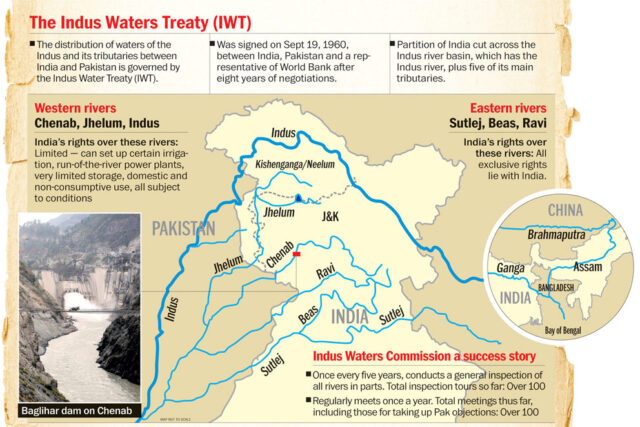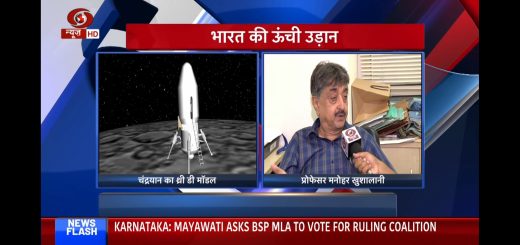Indus Water Treaty

Lok Sabha TV conducted a panel discussion on the study on Water Management of the Indus River System and its Implications for India’s Foreign Policy. The invited panelists were Prof. Manohar Khushalani, Sushant Sari and Akshay Singh.
Manohar Khushalani started the discussion by describing the Indus Water Treaty.
The Indus Waters Treaty is a water-distribution treaty between India and Pakistan, brokered by the World Bank, to use the water available in the Indus System of rivers. It was signed on 19 September 1960 by Jawaharlal Nehru, the then Prime Minister of India, and Ayub Khan, the President of Pakistan.
- Eastern Rivers
- Sutlej
- Beas
- Ravi
- Western Rivers
- Jhelum
- Chenab
- Indus
The Treaty gives control over the waters of the three eastern rivers — the Beas, Ravi and Sutlej with a mean annual flow of 33 million acre-feet (MAF) — to India, while control over the waters of the three western rivers — the Indus, Chenab and Jhelum with a mean annual flow of 80 MAF — to Pakistan. According to treaty, all the water of eastern rivers shall be available for unrestricted use in India. India should let unrestricted flow of water from western rivers to Pakistan. This does not mean that India cannot use the western river’s water. They are allowed to use it for limited irrigation and non-consumptive needs such as for generating electricity. This means that the treaty has allocated Pakistan 80 percent of the water from the six-river Indus water system. China has been kept out of the treaty even though Indus originates from Tibet because the topography of the Indus Water System does not allow China to change or stop the flow of the water. Neither of the countries can unilaterally walk out of the pact.
Indus Water Treaty is considered to be one of the most successful water-sharing endeavours in the world today. For 56 years, both India and Pakistan have been peacefully sharing the water of Indus and its tributaries, thanks to The Indus Water Treaty (IWT). But since the ratification, there have been a number of issues raised by both countries over the ethical use of the treaty and the water itself.
India has always treated the security issues and water issues as 2 different subjects.
The discussion also gave insights into the disputes and objections raised over this treaty.
The most frequently raised issue by Pakistan is that India can stop the water flow to Pakistan. Can India stop the water flow to Pakistan? No. Not as per the treaty. India can only utilize the provisions of the treaty to reduce the water flow by a small number but cannot completely stop the flow. India has in fact built many hydro power projects to which Pakistan has objected repeatedly. Even if India decides to reduce the water flow by a large amount, they do not have enough infrastructure to use the additional water and it may even create floods in Kashmir. The decision of not giving water to Pakistan may further enrage the terror elements in the country, making them intensify their attacks on India. This decision can also affect India’s relations with other countries like Nepal and Bangladesh with whom they have water treaties as well.
Most of the issues have been resolved with legal procedures and mutual understanding from both sides. Though after the 2016 Uri attacks, India threatened to revoke the Indus Water Treaty but so far the threats have not been materialised.
BTP Student: Sejal Kumar, Aysha Fazilath, Vyshakh Dharan, Rahul Patwardhan





Quite informative
Thanks Mr. Malvey
Thanks Mr. Malvey. We appreciate your encouragement